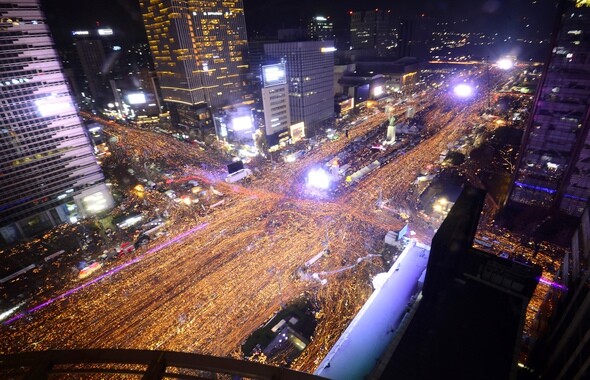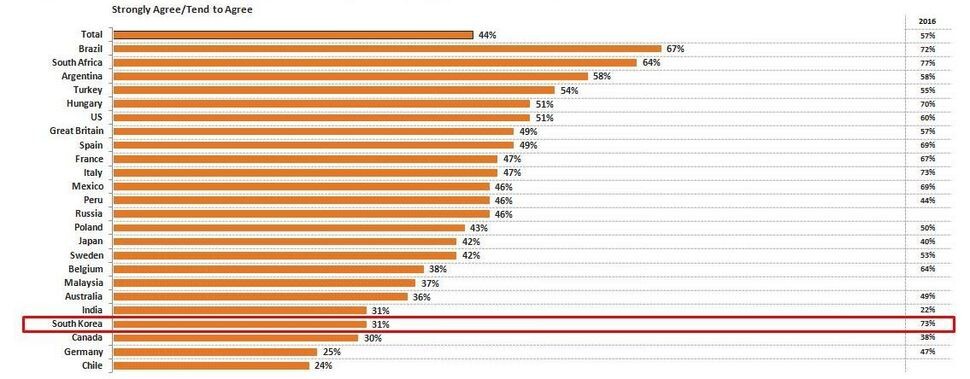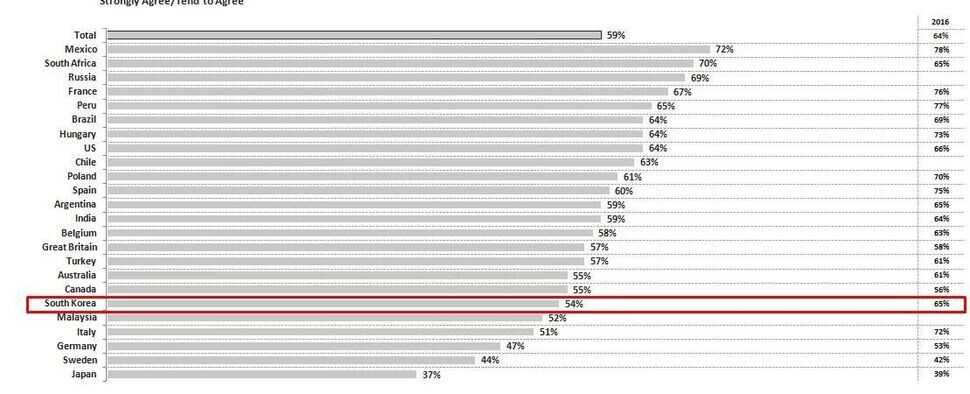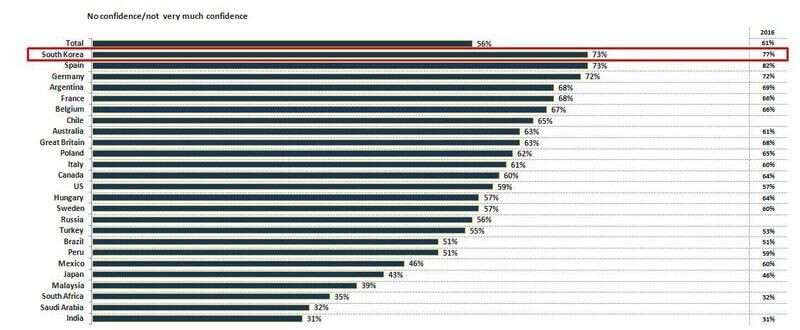hankyoreh
Links to other country sites 다른 나라 사이트 링크
South Koreans’ trust in government has increased since 2016 candlelight demonstrations

South Koreans’ trust in the government and government policies has increased since the 2016 candlelight demonstrations, according to a recent survey. It is especially worth noting that in answer to a question about whether “Your country is in decline,” only three out of ten answered in the affirmative, a sharp decrease from the seven out of ten who answered in the affirmative to the same question two years ago.
According to a report published on Sept. 26 by global opinion research company Ipsos, titled, “Beyond Populism,” South Koreans’ trust in their government and policies has increased since the last survey, conducted in 2016. In June and July of this year, Ipsos surveyed a total of 17,203 subjects in a total of 26 countries, including South Korea, the United States, Canada, Russia, Sweden, Turkey, the United Kingdom, Germany, France, Argentina, India and Japan.

In answer to a question about whether their country was in decline, 44% of participants answered in the affirmative (19% said they “strongly agree; 25% said they “somewhat agree”), in a 13% point decrease from two years ago (57% answered in the affirmative). The decrease in affirmative answers in South Korea was much greater relative to the overall decrease, indicating an increased trust in the development of the country. In the 2016 survey, 73% of participants said “strongly agree” in response to the question about the country being in decline, but in this year’s survey only 31% of participants responded in the same way.
Two years ago, the affirmative answers in South Korea amounted to 14% points higher than the overall average, but in this year’s survey the affirmative answers in South Korea amounted to 13% points lower than the overall average. Furthermore, in answer to a question about whether political parties and politicians care about “ordinary people,” the global average in affirmative answers decreased by 5% points from 64% to 59%, whereas in South Korea the decrease was more dramatic, from 65% to 54%, indicating a turn towards optimism.
Regarding this shift, Lee Sang-il, the head of Ipsos Korea, said, “It seems that for this year’s survey, compared to 2016, thanks to the candlelight demonstrations and the change to President Moon Jae-in’s administration, the people’s trust in the government or politics has increased.”

To the statement “to fix [country], we need a strong leader willing to break the rules,” 57% of South Koreans (higher than the global average of 52%) responded in the affirmative. And to on the question “It's too risky to elect political parties or leaders with radical ideas for change who haven't been in power before,” the affirmative answers in South Korea only amounted to 29%, lower than the global average (39%), indicating a greater desire for change.
On whether “the system favors the rich and powerful,” the global answers in the affirmative showed a decrease, from 69% two years ago to 64%, while affirmative answers in South Korea were higher than the global average, at 65%.
Finally, South Koreans demonstrated a greater level of distrust towards political parties, big companies and the media. A whopping 81% of South Korean participants said they had no confidence in their political parties, 5% points lower than two years ago (86%), but still indicating a high level of distrust.
In particular, distrust of large corporations improved slightly during the same period from 77% to 73%, but remained the highest among the 26 countries. Korea ranked second behind Spain (82%) two years ago, but took first place in this year’s survey. The number of respondents who stated that the media ‘could not be trusted’ rose from 67% two years ago to 73%, reaching the same level as distrust in conglomerates.

Distrust in political parties in Korea was only two percentage points higher than the global average, while the figures for large corporations and the media were 17 and eight percentage points higher respectively. The global average level of distrust in governments improved slightly from 71% to 65%, while the figures in Korea demonstrated drastic improvement, dropping from 84% to 57%.
“Trust in the government has grown through the candlelight vigils and other events that have taken place since the last survey in 2016, but there has been little change in public distrust of politics and chaebols,” Lee stated. “The reduced level of trust in the media can be partially explained by the fact that many people now associate the media with news on social networking sites.”
By Lee Jeong-hun, senior staff writer
Please direct comments or questions to [english@hani.co.kr]

Editorial・opinion
![[Column] Park Geun-hye déjà vu in Yoon Suk-yeol [Column] Park Geun-hye déjà vu in Yoon Suk-yeol](https://flexible.img.hani.co.kr/flexible/normal/500/300/imgdb/original/2024/0424/651713945113788.jpg) [Column] Park Geun-hye déjà vu in Yoon Suk-yeol
[Column] Park Geun-hye déjà vu in Yoon Suk-yeol![[Editorial] New weight of N. Korea’s nuclear threats makes dialogue all the more urgent [Editorial] New weight of N. Korea’s nuclear threats makes dialogue all the more urgent](https://flexible.img.hani.co.kr/flexible/normal/500/300/imgdb/original/2024/0424/7317139454662664.jpg) [Editorial] New weight of N. Korea’s nuclear threats makes dialogue all the more urgent
[Editorial] New weight of N. Korea’s nuclear threats makes dialogue all the more urgent- [Guest essay] The real reason Korea’s new right wants to dub Rhee a founding father
- [Column] ‘Choson’: Is it time we start referring to N. Korea in its own terms?
- [Editorial] Japan’s rewriting of history with Korea has gone too far
- [Column] The president’s questionable capacity for dialogue
- [Column] Are chaebol firms just pizza pies for families to divvy up as they please?
- [Column] Has Korea, too, crossed the Rubicon on China?
- [Correspondent’s column] In Japan’s alliance with US, echoes of its past alliances with UK
- [Editorial] Does Yoon think the Korean public is wrong?
Most viewed articles
- 1‘We must say no’: Seoul defense chief on Korean, USFK involvement in hypothetical Taiwan crisis
- 2Will NewJeans end up collateral damage in internal feud at K-pop juggernaut Hybe?
- 3[Column] Park Geun-hye déjà vu in Yoon Suk-yeol
- 4Why Korea shouldn’t welcome Japan’s newly beefed up defense cooperation with US
- 5Thursday to mark start of resignations by senior doctors amid standoff with government
- 6N. Korean hackers breached 10 defense contractors in South for months, police say
- 7[Guest essay] The real reason Korea’s new right wants to dub Rhee a founding father
- 8[Column] ‘Choson’: Is it time we start referring to N. Korea in its own terms?
- 9Kim Jong-un expressed ‘satisfaction’ with nuclear counterstrike drill directed at South
- 10[Editorial] New weight of N. Korea’s nuclear threats makes dialogue all the more urgent